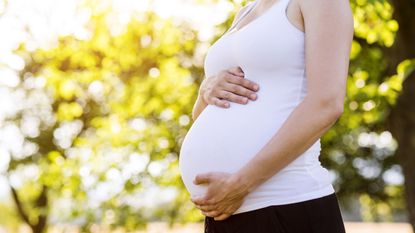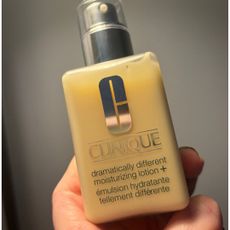Women over 40 now have a higher fertility rate than ever before
Mums are getting older as more women over 40 fall pregnant

Plus what you need to know about monitoring your fertility
Worried about holding off on getting pregnant? Well don’t be as, for the first time since 1947, the birth rate of women aged 40 and over has surpassed that of women aged 20 and under.
According to the Office for National Statistics, the older age category had the biggest percentage increase in fertility rates in 2015 after rising 3.4%.
As a result, the fertility rate amongst forty-somethings has more than trebled since 1981, reaching its highest point in almost 70 years.
Meanwhile, the category of women aged under-20 had the largest percentage decrease, falling 7.1% as the number of teenage pregnancies continued to decline. So why the upwards age trend?
According to the report: ‘In most developed countries, women have been increasingly delaying childbearing to later in life, which has resulted in rising fertility rates among older women. This may be due to a number of factors such as increased female participation in higher education and the labour force, the increasing importance of a career, the rising costs of childbearing, labour market uncertainty and housing factors.
‘Rising fertility rates at older ages have affected the average age of mothers, which has been increasing since 1975, reaching 30.3 years in 2015.’
Marie Claire Newsletter
Celebrity news, beauty, fashion advice, and fascinating features, delivered straight to your inbox!
Despite this increase in older mothers, it is still women aged 30-34 who have the highest fertility rate of any group, notching up 111 births per 1000 women. So while the chances of getting pregnant later are improving, you still have a better chance of conceiving under the age of 35.
According to the NHS: ‘The age at which women first become mothers in the UK is continuing to rise, but as women get older the number and quality of egg cells that are produced by the ovaries declines. [As a result] both mothers and babies face an increased risk of pregnancy-related complications and health problems.’
The message is simple: you’re better off getting pregnant before the age of 35 but if it doesn’t happen, don’t sweat it. Your chances of getting pregnant in your 40s is now better than ever.
Should I take a fertility test?
‘There is no 'magic number' at which female fertility declines but we know that eggs deteriorate with age,’ says Infertility Network UK’s deputy chief executive Susan Seenan.
‘The speed of that deterioration will vary but rises more steeply after the age of about 35. The more “fertility aware” you are the better, so you can make an informed decision and be aware that it might take you longer to conceive,’ she adds. You could also try using a fertility calculator to better track your chances of conception.
It's probably best to find out how fertile you are by getting tested. ‘Each woman is different when it comes to fertility and we can now use blood tests and ultrasound scans to see the fertility potential by looking at egg reserves,’ explains Zita. ‘The more egg reserves you have the better your fertility, however this won’t tell us about the quality of the eggs,’ she warns.
One of the biggest issues with getting pregnant later on is that your eggs could be damaged. ‘Older eggs are likely to be chromosomally abnormal, especially if you are in your forties,’ says Zita.
As well as this, it may take longer to conceive as you age. ‘On average, it can take up to a year to conceive [in your forties], so you need to look ahead and start earlier bearing this in mind,’ she adds. ‘The older you are, the greater the chance of having other factors that will hinder conception too.’
According to the NHS, around one third of couples in which the woman is over 35 will experience fertility problems, and this rises to two-thirds when the woman is over 40. But that still means that lots of women in the 35+ age bracket are getting pregnant easily.
The best things you can do to try to protect your fertility and prolong your chances of conceiving later on are getting checked regularly for STIs (chlamydia and gonorrhoea can damage your fallopian tubes), maintaining a healthy weight, drinking sensibly and avoiding smoking.
Look after yourself and your sexual health and there's no reason that you can't have a happy and healthy pregnancy in your forties.
The leading destination for fashion, beauty, shopping and finger-on-the-pulse views on the latest issues. Marie Claire's travel content helps you delight in discovering new destinations around the globe, offering a unique – and sometimes unchartered – travel experience. From new hotel openings to the destinations tipped to take over our travel calendars, this iconic name has it covered.
-
 One bottle of this iconic moisturiser is sold every 3 seconds and it has always been my go-to for keeping dry and rough skin at bay
One bottle of this iconic moisturiser is sold every 3 seconds and it has always been my go-to for keeping dry and rough skin at bayLoved by generations for a reason
By Matilda Stanley
-
 Over the past year this make-up artist-founded brand has excited us beauty editors the most - here's what to buy
Over the past year this make-up artist-founded brand has excited us beauty editors the most - here's what to buyLisa Eldridge knows what we want before we want it
By Tori Crowther
-
 I walked 8k steps a day for 7 days - and can't believe how much it boosted my mental and physical wellbeing
I walked 8k steps a day for 7 days - and can't believe how much it boosted my mental and physical wellbeingIt’s been really key to helping me feel my best.
By Rebecca Shepherd